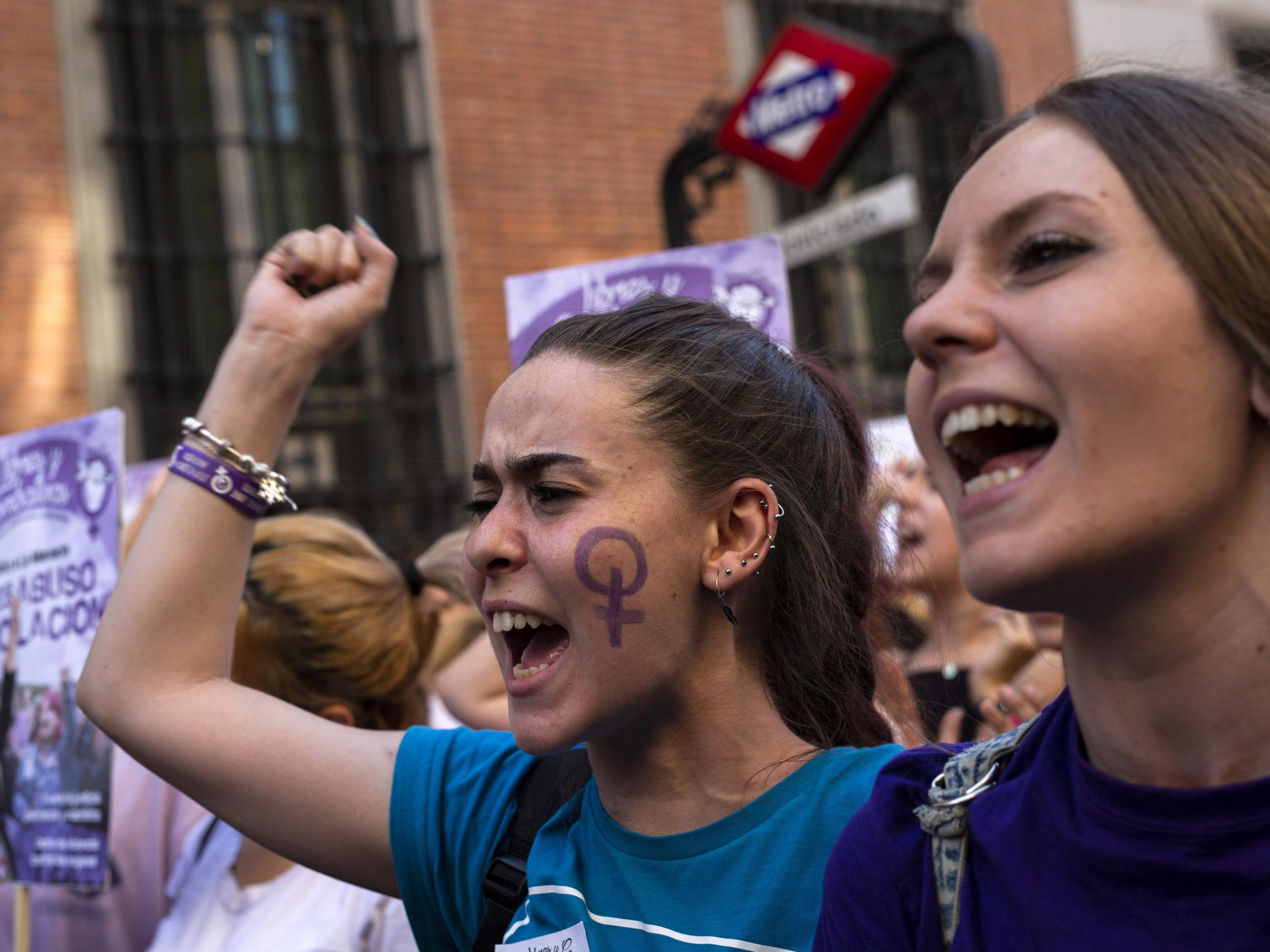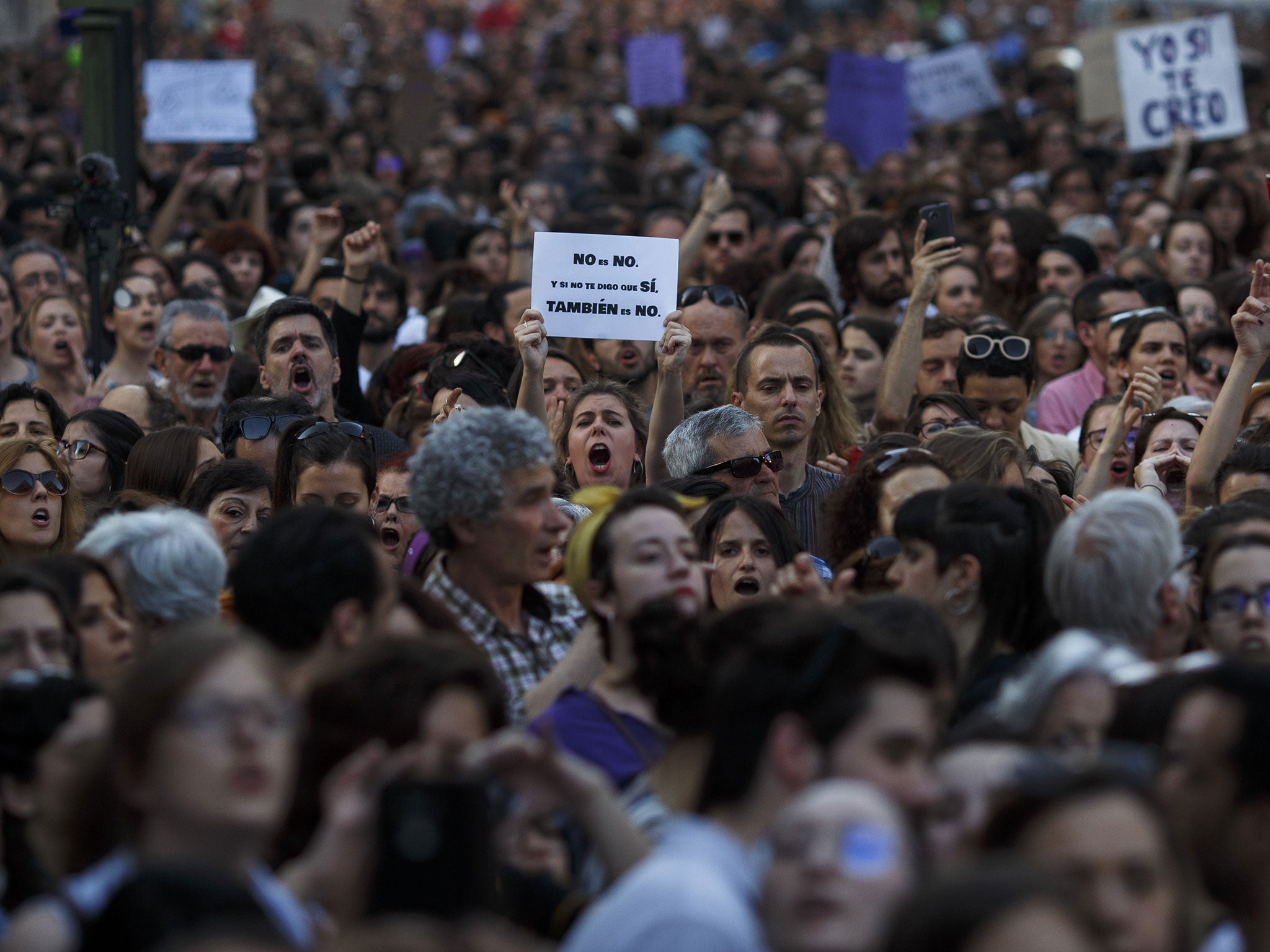Fresh outrage in Spain as ‘wolf pack’ rapist’s sentence is reduced under botched law: ‘It’s a joke’
The appalling gang-rape of a young woman at the Pamplona festival in 2016 forced a change in the law, writes Graham Keeley in Madrid. But it also left a loophole that has led to more than 1,000 sentence reductions in prison time for sex crime convicts


It was a case that shocked Spain. The gang-rape of an 18-year-old woman at the running of the bulls festival in Pamplona in 2016 by a group of five men who called themselves the “wolf pack“ in their WhatsApp group.
Shock turned to outrage when the men were initially convicted of the lesser offence of sexual abuse, because the court ruled the victim did not resist out of fear. Nationwide protests followed and in 2019, the Spanish Supreme Court overturned the original decision and jailed the men for rape and raised their sentences from nine to 15 years.
The outcry over the case led to a change in the law which was supposed to give women greater protection. Last year, Spain’s left-wing coalition government brought in a consent law known as “only yes means yes”, which reformed the criminal code to define all non-consensual sex as rape.
Under the old legislation, rape convictions could only be secured if prosecutors could prove that violence or intimidation had been used. Often, a lesser charge of sexual abuse was alleged if these factors could not be proved.
However, under a loophole in the new law, it also set lighter minimum sentences for certain sexual crimes – the result of merging the crimes of sexual abuse and aggression – which has inadvertently benefited some convicted criminals. Since the law took effect last October, courts have applied more than 1,000 sentence reductions which has led to the release of over 100 convicted sexual abusers. Even though this amendment was later changed, in Spain the most favourable criminal disposition benefits the defendant.
In April this year the prime minister Pedro Sanchez apologised to victims for what he called the undesired effects of the new law.

Now, a Spanish court has reduced the sentence of one of the rapists in the notorious “wolf pack” case. The decision has prompted protests across the political spectrum, condemning the decision of a court in Navarre in northern Spain to cut the sentence from 15 years to 14. The decision can be appealed before the Supreme Court.
Alberto Nunez Feijoo, the leader of the conservative opposition People’s Party (PP), said a government which fashions itself as feminist did not care for victims of rape.
“There has not been a government who treats rape more as a joke,” he told reporters.
In their ruling, the judges said they had accepted an appeal to reduce the man’s sentence to bring it in line with the new law, but one of the three judges opposed the decision.
“This is very bad news. The law was supposed to protect women but not cut sentences for offenders. The judges have not done this with this decision,” said Arantxa Lopez, spokesperson for the 8M Commission in Madrid, a feminist organisation.
“We would put the emphasis on defending women and providing more security against sex offenders.”
Isabel Rodriguez, Spain’s acting government spokesperson, told a news conference that the government takes the interests of victims of sexual violence “seriously”.
Gabriel Rufian, spokesperson for the separatist party Catalan Republican Left, posted on X: “It seems very strange that these people reduce sentences for rapists and it is surely Irene Montero’s fault.”
Ms Montero, the acting equality minister who helped draw up the sexual consent law, has previously been condemned by the General Council for the Judiciary (CPGJ) for ignoring their warnings about how the law would benefit some convicted sex offenders. She has also blamed judges for misinterpreting the law, a claim which the CPGJ has denied.
After judges cut the sentence, Ms Montero posted on X: “Consent and the right to sexual freedom must be guaranteed by all powers of the state. This decision by the [court] is very painful, especially for the victim. We take care of your pain and know that all victims deserve reparation.”
In the run-up to national elections in July, the PP tried to use the “only yes is yes” fiasco to damage the left-wing coalition and take power, but the result was a hung parliament which may lead to another election.
However, Mariam Martínez-Bazcunan, a political expert who specialises in feminism at the Autonomous University in Madrid, doubts the “wolf pack” case would damage the Socialist-led coalition, which hopes to form a new government, in the long term.
“Obviously this sentence reduction in such a controversial case is regrettable but I don’t think this will have any political repercussions because the government has [already] amended the law,” she told The Independent.






Join our commenting forum
Join thought-provoking conversations, follow other Independent readers and see their replies
Comments